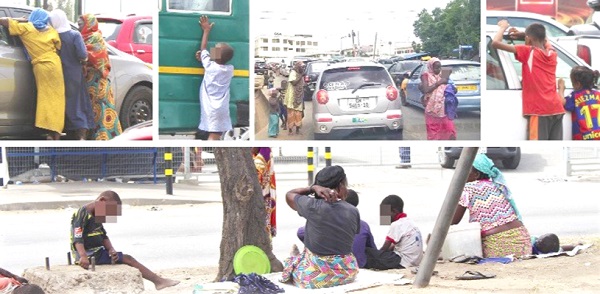In recent years, there has been increased activities of beggars on the principal streets of cities in the country, although begging is a criminal offence under Section 2 of the Beggars and Destitutes Act, 1969 (N.L.C.D. 392).
Arguably, Accra is the leader in the activities of beggars in the country. Over the years, I have encountered these seven categories of beggars on the streets of Accra. I describe them by their status and the way they operate.
Categories
Professional Beggars: These are mostly able-bodied people who have made up their minds they will beg as a source of livelihood.
These people love begging, they enjoy begging and they don’t want to do any other thing in life apart from begging.
I dare say that even if you attempt to help them secure decent jobs or set up businesses for them, they will still go back to begging.
Lying beggars are the category of beggars who may also be professional beggars. In addition to being professional beggars, they have mastered the art of begging by carefully crafting emotionally blackmailing stories full of lies.
These beggars mostly come up with stories of needing financial assistance for medication, hospital bills, food and transportation, among others.
One will think that but for their needs, they wouldn’t be begging. However, this is just a scheme they use to solicit financial assistance from sympathetic people.
Circumstantial beggars are mostly physically challenged people who due to unfortunate circumstances or their physical challenges are unable to engage in any decent jobs or business venture, hence the resort to begging.
The fourth group is called “aggressive beggars”. This category of beggars mostly resort to the use of verbal or physical abuse to compel their targeted individual to give them money.
Most often, they get offended and use abusive words on an individual if they ask for money politely and the said individual refuses them.
They may also physically restrain you in the street by grabbing your hand, holding your dress or bag just to compel you by the discomfort to give them money.
The fifth is casual/occasional beggars. These are able-bodied people who are not professional beggars.
However, occasionally these people resort to begging to augment their income from whatever business activities they may be engaged in.
The sixth category of beggars in the city is the “need-based beggars”. These are people who beg on the street because they have genuine needs that they don’t have any means of taking care of other than begging.
Most often once the said need is met, they stop begging and undertake their normal activities.
The seventh group is child beggars. These are children below the age of 17 years who are mostly used by professional beggars to undertake their begging activities.
This category of beggars has been introduced in recent years by the influx of migrant beggars from some parts of West Africa.
These children cling on to individuals on the street to collect money from them while their parents or guardians relax under shade supervising their activities.
Most children would not be held criminally responsible for begging. However, it is a criminal offence to use children to undertake begging activities.
Such an act is deemed as Exploitative Child Labour under Section 87 of the Children’s Act.
Beggars, Destitute Act
Section 5 of the Beggars and Destitutes Act provides that a person who permits or encourages another person to beg commits a criminal offence.
The person is liable on conviction to a fine not exceeding GH¢1,800.00 or to a term of imprisonment not exceeding three months or both.
The question is why do many people still give to beggars despite the possibility of suffering these penalties if arrested?
Giving
Most religions globally believe in giving to the needy in society. Also, our socio-cultural orientation as Ghanaians encourages the giving of alms to the needy in our communities. As such, it is not surprising that many people without hesitation give to these categories of beggars identified above when they encounter them on the street.
If you are a Christian believer like me, you might seek solace in Mathew 5:42 (ESV) which admonishes us to “Give to the one who begs from you, and do not refuse the one who would borrow from you”.
If you are a Muslim, you might draw inspiration from one of Islam's pillars, Zakat, which is alms giving or charity.
Whatever your reason for giving to those who beg on the street, there is always a contrast between adhering to your religious beliefs and your civic duty not to encourage beggars on the street by giving alms to them.
The writer is a Legal Practitioner, E-mail: barnabas.abisa@gmail.com

